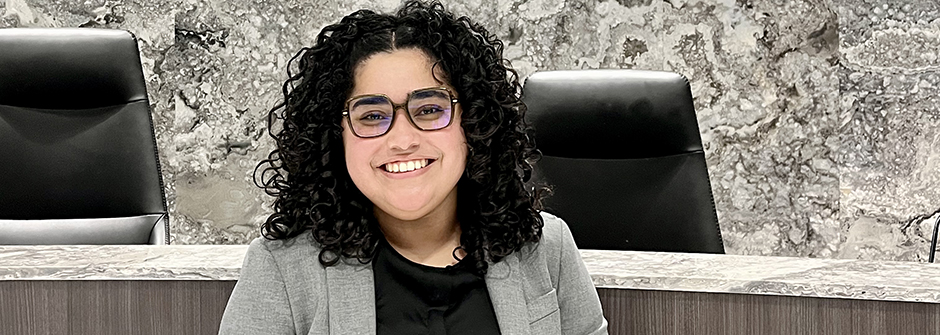
Genesis Canela is a 3L LEO Fellow at Seton Hall Law. During her tenure at Seton Hall, Genesis worked at Organon as a Legal and Compliance Intern and at JP Morgan & Chase as a Compliance Summer Associate. In law school, Genesis has served as a member of the Interscholastic Moot Court Board, the Vice President of MetroLALSA, and as a representative for BARBRI.

1) What motivated you to pursue a legal education?
Growing up in Newark, the criminal legal system was introduced to me early in life.
I witnessed my classmates routinely ensnared in the criminal legal system and neighbors’
homes raided by police. As a survivor of a violent crime, I experienced firsthand
my own chaotic, traumatizing journey with system actors. I painfully learned that
the system does not make us safe or, in the least, protects some while dismissing
others, like those from my neighborhood. I realize that what I know, why I know it,
and how I grew up, have instilled a resilience, rooted in humility and compassion,
that positions me to be that person who defends those in my community upon whom the
criminal legal system sets its sights on.
2) How has being a part of the LEO program affected that experience?
Being a part of the LEO program has provided me some of my closest friendships who
have really been my support system to help me get through law school.
3) What advice would you give 1L LEOs?
Everyone’s path is different. If you dedicate your time to activities and events that
you are actually passionate about everything will work itself out. Try to expose yourself
to a little bit of everything and do not feel like you have to do one thing over the
other because that is what everyone else is doing. If you come to realize that you
did not enjoy a particular experience, learn from the experience and pivot; it’s never
too late (this advice comes from a 3L that decided to completely change post-graduation
plans after accepting a post-grad offer)! Rely on the resources available to you,
including resources outside of the law school, and build relationships with your professors,
as their mentorship will go way beyond law school.
4) What drew you to the opportunities you pursued during your education?
Being first-generation really drove me to want to try a little bit of everything.
I tried in-house positions both within legal departments and compliance departments,
I was a law clerk at a firm and, through the clinic, tried criminal defense. Through
my experiences both working and interviewing, I learned what I liked and did not like.
Also, make sure to use interviews as an opportunity to learn your potential employer;
you have to really consider whether the employer is a good fit for you as well.
5) What are some of the most memorable experiences you have had in law school?
I had the honor of being a part of the Seton Hall Law Criminal Defense and Community
Advocacy Clinic. This opportunity has allowed me to give back to my community directly
and I truly could not be more grateful to have been part of the Clinic. The experience
of being able to manage a case while being trained in a smaller setting and the interactions
you get to have with clients is invaluable. I do not think a traditional law school
class can teach you how to communicate with your client or deal with unexpected issues
that can arise in a case at any given time.
6) How did your clinic experience at Seton Hall Law impact your career path?
I thought before doing the clinic that I was transactional girly through and through.
Now, I cannot imagine myself doing anything else but pursuing a criminal defense career.
Defenders’ work humanizes. Through the clinic, I am most interested in the detailed
work that builds the defense and humanizes the community member. Through high-caliber,
holistic, and client-centered direct representation, I seek to dismantle the inhumanity
within the criminal legal system.
7) What skills/strengths/lessons did you gain from your clinic experience?
I have learned to think on my feet and pivot when necessary. There are times you will
receive discovery right before a case management conference and that completely changes
what you had prepared to put on the record. I have learned to review a criminal complaint
with utter suspicion; identify pre-trial and trial issues; analyze every single word
of the complaint to put together discovery requests and investigation requests; and
gather evidence to mitigate charges.
8) What advice would you give to students participating in Seton Hall Law’s clinics?
Do not approach clinic like a traditional law school class. Yes, you do receive a
grade for it at the end; however, these are people’s lives that are in your hands.
Remember that often what brings a person to sit in front of you is some of the worst
experiences they have ever had to deal with. Approach your client as people not just
a case.
9) What are your goals in pursuing a career in criminal law?
I want to stand against the traumatizing chaotic system that seeks to continue to
be a revolving door with no regard for the human they are interacting with. I hope
I can humanize the system even if it is just one case at a time. My long-term professional
goal is to defend community members facing federal charges at the trial level and
transition to a capital habeas corpus unit.
10) What are you looking forward to the most in practicing law?
I look forward to being able to continue my work with community members facing criminal
charges and dedicating myself to making the legal field more accessible to those the
legal profession has historically excluded.
OCS maintains a wide range of resources on Symplicity, which has current job postings, access to our recruiting programs, career tools such as our resume and cover letter guide, and more.